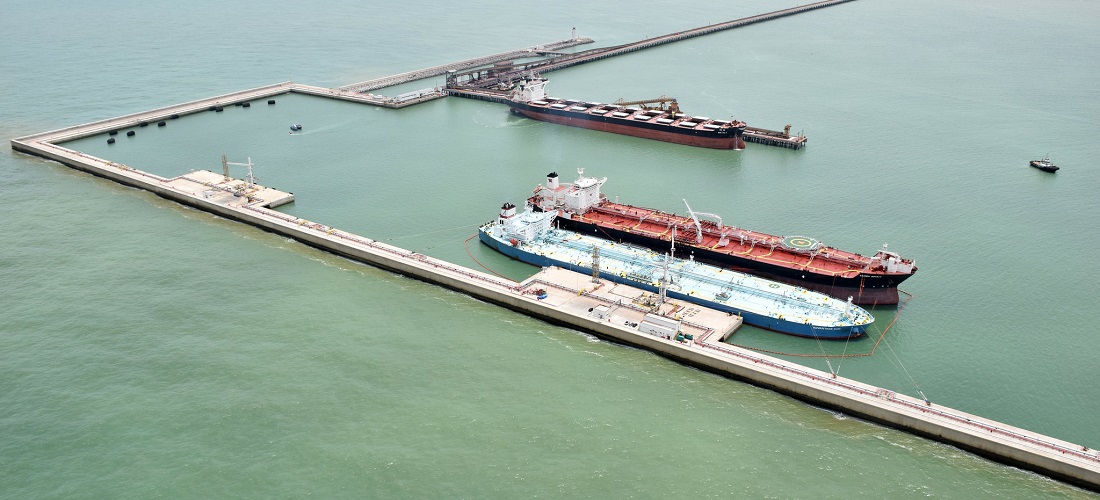
Port of Açu to structure platform decommissioning facility
Mar, 05, 2024 Posted by Gabriel MalheirosWeek 202410
Petrobras recently started a program for oil platform decommissioning, whose goal is to decommission more than 50 platforms by 2034 due to the end of either oil field production or the units’ useful life. The activity has gained importance for environmental reasons and has caught the attention of Port of Açu. The company has signed a contract with the state-owned company to dismantle three Petrobras facilities and, in parallel, is designing a “dismantling line” for platforms as a new business line for the company, which is controlled by Prumo Logística.
Port of Açu will dismantle the P-26, P-33, and P-37 platforms, which were sold to Gerdau as scrap and whose steel will be used to manufacture new by-products. The P-33, the first to be dismantled, docked at Port of Açu for initial services on February 14. The agreement includes berthing, hull cleaning, and disposal of the unit’s effluent and waste.
According to the CEO of the Port of Açu, Eugênio Figueiredo, in his first interview after taking office in January, the contract is the first step towards creating a “sustainable decommissioning center” with areas for “parking” and dismantling platforms.
The decommissioning of platforms has become a service—and has entered Port of Açu’s radar—because oil companies are considered responsible for these assets, even when the units leave the scene, with potential damage and risks to ESG policies. The environmental risk of dismantling is no longer automatically transferred to the buyer of the platform that will be scrapped, said Mr. Figueredo.
Therefore, the service is not only about the disposal of materials, but the treatment of the entire process, which includes the cleaning of structures, the proper disposal of effluents (such as oil and chemical residues), and the dismantling itself.
By 2028, Petrobras will have decommissioned 23 platforms, according to the 2024-2028 strategic plan. Some of them, for example, will be replaced by new units that will work on plans to revitalize the Campos Basin. In the domestic market, there are a total of 58 platforms of oil companies, in addition to Petrobras, that could be decommissioned in the next 10 years, according to a study conducted by Port of Açu itself.
“There is a very interesting market size, both nationally and globally, that needs to be addressed,” said Mr. Figueiredo. “We are conducting studies and discussions to move this chain forward, with more services being carried out at the Port of Açu.”
The port’s competitive advantages include its location, close to oil fields in the Campos and Santos basins, and the distance between steelmakers.
Vinícius Patel, Port of Açu’s director of port administration, said that the plan is to structure an area with the capacity to dock up to eight units, which could reach up to 10, depending on the design of the facilities. The advantage of this location for the oil companies would be the possibility of speeding up the decommissioning of the fields.
“A very important point is that by doing this in a moored structure, there is an increase in the level of safety and a reduction in costs for a market that has deadlines to meet with the ANP [National Agency for Petroleum], which has deadlines for revitalizing fields,” said Mr. Patel.
The executives do not talk about the investment figures, which have not yet been finalized, but they will not be high, considering that the adoption of the new strategy requires adaptations to the existing structure and therefore will not require major expenditures by the company.
Port of Açu is not only looking to the domestic market: IHS Market predicts that global spending on offshore decommissioning will be around $100 billion between 2021 and 2030.
Messrs. Patel and Figueiredo point out that the decommissioning process is not limited to oil rigs, as it can also be applied to the shipbuilding industry, where end-of-life ships are not properly disposed of in Brazil. Take, for example, Guanabara Bay (Rio de Janeiro), which the executives point out has become a ship graveyard. Mr. Patel points out that there are structures for dismantling ships and platforms in regions such as the United States, the North Sea, the Mediterranean, and Asia, but not in the South Atlantic.
In November 2022, a ship anchored in Guanabara Bay broke free of its moorings and crashed into the Rio-Niterói Bridge, disrupting rush hour in two of Rio’s major cities.
“The merchant marine market has no support in the South Atlantic. This environmental standard is no longer accepted, and that strengthens an industry that will deal with it properly,” said Mr. Patel.
Source: Valor International
Click here to read the original news report: https://valorinternational.globo.com/business/news/2024/03/05/port-of-acu-to-structure-platform-decommissioning-facility.ghtml
-
Ports and Terminals
Jul, 13, 2022
0
China port congestion seen growing on back of local lockdowns and poor weather
-
Grains
Oct, 18, 2019
0
Brazilian rice gains competitiveness to export
-
Ports and Terminals
Nov, 21, 2021
0
ANTAQ auctions areas in the ports of Santos (SP) and Imbituba (SC) for more than R$ 550 mi
-
Economy
Jun, 29, 2022
0
Flexibilization of sanitary measures gives impetus to businesses in China


